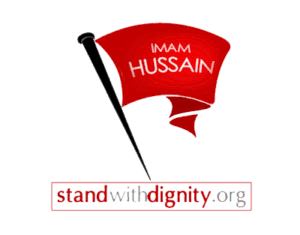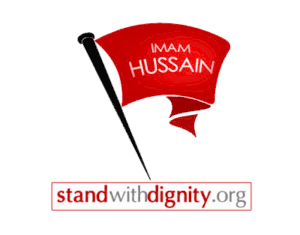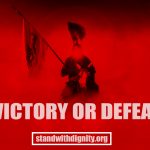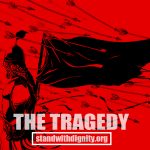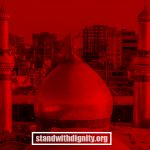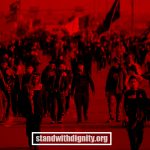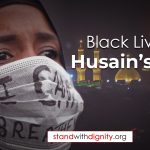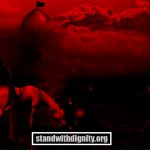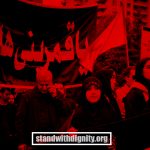By Dr. Begum Fatima Shahnaz
In the name of Allah, the Beneficent, the Compassionate, the Wise: As-Salaamun-alaikum!
I would like to address the philosophical essence of the ‘Quintessential Karbala,’ or the Pledge of Allegiance made by Imam Hussain and members of the Ahlul-Bayt, the Holy Family, in their flight from Medina under the despot, Yazid, and their subsequent slaughter, their capture, (presence) in the palace of the governor of Kufa, their humiliation of Yazid’s court in Damascus where the survivors were brought shackled.
Through this analysis we shall get an overview of the real meaning of the moral dimensions of this tragedy, and of Imam Hussain’s Great Protest against tyranny, oppression, imperialism and injustice; we shall bear witness to his dauntless stand for Human Rights, equity, civil liberties. Reason over the specific threat of servitude that would trigger a moral degeneration of the Islamic body. Only half a century ago, the world said: NEVER AGAIN! To the holocaust of the Third Reich. A tiny Muslim nation, Afghanistan, was instrumental in activating the collapse of the Soviet totalitarianism and atheism in 1989. But the martyrdom of Imam Hussain has transcended 1400 years, a benchmark case in the history of human rights: The exalted example of martyrs of Karbala epitomizes Islam itself, what it stands for, and its substantive and ethereal integrity, besides all that the Holy Family stood for, lived for, and died for. How could it be otherwise, according to an Ayah of Glorious Quran (The Surah Qalam, 68:4 the Pen). “And thou standest as an exalted standard of character.”
The emblem of Karbala, the ideals Imam Hussain died for, were character, moral integrity, uncompromising virtue and piety to perpetuate the purity of Islam itself, to shield it from the corruptions of venal opportunism most of the religions of the world have undergone. It was to halt the devolutionary or self-destructive process of faith through nihilism that Imam Hussain made the Supreme Sacrifice, so that the Islamic continuum could be rooted in the evolutionary and expansionary spectrum of life. Again, how could we expect less of any champion of faith, human rights uncorrupted leadership of social policy? In the West, the Socratic tradition symbolizes that choice, the death Socrates chose over compromise to corrupt statehood! But that was merely a philosophical and political choice; Imam Hussain’s Martyrdom was a Pledge to Allah, and to Islam alone – which means the unconditional surrender to God, without parallel. Furthermore, how could the most shining example of the Holy Family of Islam, the son of Ali and Fatima Zahra, be less than the embodiment of the Supreme Sacrifice of his life and the lives of his dearest kin, to save mankind from moral servitude and subservience? To understand the Sacrifice of Imam Hussain is to go back in time to the primal Pledge of Allegiance of Abraham, who offered his own son to God, thus submitting to Allah alone![1] That pledge was a moral challenge between the ethereal submission to a Higher Cause, a Higher Order or Power, over servitude to worldly power, as personified by the despot, Yazid, in the case of Imam Hussain. To have submitted to Yazid as the Caliph of Mecca would have signified Imam Hussain’s acquiescence to political corruption and tyranny, to moral turpitude, and a degeneration of the Islamic principles. This capitulation by Hussain would have fostered a decline of Islamic society through progressive erosion of the integral faith. And this was precisely the subversive corruption of the faith Yazid’s Machiavelli intrigues targeted in order to undercut any unifying principles of the Islamic body. Islam was a revolutionary faith in that in subverted the very order of governance and dominance through imperialistic oppression, epitomized by Yazid. Islam liberalized the inequities of hegemonistic social systems under former pagan imperialism, and as all minorities, the urgency of Islam was viewed as subversive by tyrants and imperialists. So the first Pledge of Imam Hussain was as a champion, a Deliverer of the Oppressed, in order to maintain the liberalizing force of Islam and its integrity violated through moral acquiescence to imperialism, which as I said earlier, would cause its internal erosion, falling into Yazid’s political game plan. We have diverse modern examples of this Crisis of Conscience in societies, in the uncompromising Freedom Struggles from Bosnia to Kashmir, Palestine to Chechnya, Afghanistan the Indian and Afro-American Muslims, the Caucasus, Inner Mongolia and Eastern Turkestan in China, Africa, Iran, the Middle East. All the Muslim minorities engaged in sustaining the integrity of the Islamic faith are not only ‘Shaheed,’ Martyrs, but they are also committed to man’s inalienable rights to self-determination, justice and dignity. While they have been demonized and stereotyped by negative anti-Islamic propaganda as ‘terrorists,’ ‘radicals, ‘militants’ or ‘fundamentalists’ their Cause is essentially of a Higher Order and commitment to man’s inalienable rights. Imam Hussain’s sacrifice symbolized the unifying, principles of Islam inherent to that transcendent and ethereal Cause not rooted in political power, territorial integrity, nationalism, tribalism, partisanship and factionalism, sectarianism (neither Shia nor Sunni), but focused on Allah alone, on the body Islamic in toto. In this sense, Imam Hussain’s sacrifice transcends other political struggles throughout history, such as the tenacity of the Greeks of Sparta, Leonidas at the Battle of Thermopylae, The battle of Stalingrad in World War II, and others. Universal through this transcendent element, Imam Hussain’s martyrdom was that refusal to acquiesce before a cowardly compromise, to collude and participate in self-destruction and the moral decline of a society and a faith. All freedom Struggles and Human Rights movements stand for that ideal.
Mohandas K. Gandhi, the Freedom Fighter for India’s Independence movement, acknowledged Imam Hussain’s Martyrdom was his own ideal! A whole new form of Psychological Warfare and victory were initiated by Imam Hussain, which Gandhi called ‘Passive non-cooperative, non-violent resistance. ‘But what Imam Hussain’s death truly signified was the implicit victory through an apparent defeat, the triumph over blatant imperialism. An arsenal of artillery in negative (anti) Islamic propaganda has been unleashed to obfuscate the realities of this martyrdom of Karbala, including the backward image of Muslim women, in order to demean them. But Imam Hussain’s sister, Zainab, was instrumental in the triumph of Karbala. How could the paragons of moral perfection, the children of Ali and Fatima Zahra, the Prophet’s daughter, the most virtuous role model of all time, fail to live up to their antecedents? Ali, Asadullah, the Lion of God, the hero of Badr and Khyber, was renowned not only as a Champion of Faith, but for his love, loyalty, and courage; for his Voice of Peace, mercy and Compassion; his philosophy and rhetoric. Ali’s Jihad was based on Reason over ignominy, obscurantism, corruption. Tyranny, expansionism and imperialism. Ali was the Voice of Justice and Compassion, and it was Ali who was found sleeping in the bed of the Messenger of Allah when assassins came to kill him (the Holy Prophet) amongst, the other sacrifices of the House of Ali and Fatima. The Holy Family often starved themselves of food in order to feed the swarms of visitors to their home! Kings, such as the Mughal Emperor, Aurangzeb, would not hold a candle up to them. Aurangzeb stated, “May my father and my mother be sacrificed over Ali and Fatima.”
Zainab, who left her adoring husband, Abdullah bin Jafar, to follow her brother into the bloodbath of Karbala, saw her sons, Aun and Mohammad, slashed to death before her eyes. Her brother’s decapitated head was laid before her. She was brought shackled in chains to the court of Yazid at Damascus, where she best summarized the meaning and fragility of political power. Yazid, gloating over his victory, declared to Zainab: “Allah gives the kingdom to which he chooses!” Zainab replied, “Take head, Yazid, for Allah also takes account of your sins and gives you a long rope to hang yourself!” We see the law of accountability by leaders in democratic Islam. Zainab was also one of the most erudite and intellectual ladies of Islam, and taught the Tafsir of the Quran to ladies.
The tragedy of Karbala in which she was captured has transcended centuries with ever-opening new wounds because it gives a new and higher dimension to man’s struggle for Truth and Justice. These were the ideals that inspired the democratic Freedom Struggles of the world, but also the Western Enlightenment, the Renaissance, and European humanism. Imam Hussain’s Great Protest, his final choice, his commitment to death over acquiescence to imperialism and servitude emblemized the Islamic principal itself. He declared for all of us to remember
“Ye people! The Prophet of God has said that whoever sees a ruler who is a tyrant, who forbids what is permitted by God and permits what is forbidden by God, who breaks the covenant of God, reverses the way (Sunnah) of the Prophet, and oppresses and represses God’s people, and after seeing all this, makes no protest, by world or action, then he will be deserving of the same punishment from God as the tyrant. See ye not that these rulers have relapsed from obedience to God and submitted to the authority of Satan, they are spreading mischief on earth; have abrogated the laws of God; look upon the revenues of the state as their private property, and it is my right and privilege, more than of anyone else, to protest against this state of affairs, for am I not the nearest and dearest to the Prophet”
Don’t we, in this injunction, recognize the profile of so many government leaders today who are sellouts or puppets to the puppeteers of imperialism, no matter what cover or camouflage it comes under? Of course Islam personified by Imam Hussain is revolutionary! Western moralists like Etienne de la Boetie of France, advocates of man’s rights to individuation, could have echoed Imam Hussain’s words on slavery. In the Discourse on voluntary servitude, La Boetie prescribed a definition of tyranny and the psychological dominance of tyrants. He said the urge to freedom was man’s natural state, that event the animal resisted capture because captivity was unnatural in that it denatured it! That liberty is natural to the human condition, and that liberty dies by being denied. Liberty is not unconditional, and that if one yields to expansionism or the tyrant, one makes him mightier.
La Boetie wrote: “He who domineers over you has only two eyes, only two hands, only one body, no more than is possessed by the least man. He has indeed nothing more than the power that you confer upon him to destroy you. Where has he acquired enough eyes to spy upon you if you do not provide them yourselves? How can he have so many arms to beat you with if he does not borrow them from you? The feet that trample down your cities, where does he get them if they are not your own? How does he have any power over you except through you? What could he do to you if you yourselves did not connive with the thief who plunders you, if you yourselves were not accomplices of the murderer who kills you, if you were not traitors to yourselves…?”
This is the key to the dilemma Imam Hussain had to face; only his choice was between the Pledge of Allegiance to Allah over allegiance to the political tyrant. The choice was self-destruction, or preservation of Islam and the Muslim peoples, societies, the enduring value structures transcendent and inextinguishable over time. This is the ethereal message of Karbala to all mankind, indiscriminately. A similar dilemma in Christianity faced the Archbishop of Canterbury, Thomas Becket, who refused to corrupt the religion in favor of the laws of the King of England, Henry II, for which he was executed. The French author, Jean Anouilh, wrote a play entitled: “Becket, or the Honor of god.” The Final Choice was again between the Honor of God, over the Power of Man.
With regard to the inherent message of Supreme Sacrifice defined for Muslims in the Glorious Quran, it is written in the Surah Aanam: 6:62: Truly, my prayer and my service of sacrifice, my Life and my death, are (all) for God, the cherisher of the world.”
Ever Since Karbala, until eternity, all Muslims have to stand up for Imam Hussain and the Ahlul Beit’s unconditional commitment, sacrifice and martyrdom to save Islam’s unifying principles, to perpetuate the sanctity of human life. I end with Imam Hussain’s own worlds: “If the Deen (religion) of God can be saved only through my sacrifice, here I stand in presence of God, offering in live and gratefulness, all that I possess, the lives of me and my dear ones ready for all the sufferings and humiliation, for all this belongs to God and God is always with me. The ‘Deen’ of God must be saved. Where are the swords of the enemies? Come and get me, for I am ready.”
In the name of Allah, the Compassionate, the Merciful, let Imam Hussain’s martyrdom to save our souls not have been in vain; and when the Last Trumpet calls and our own time comes, let us not be afraid to make that Supreme and unconditional Sacrifice for Islam.
Academic discussions among my people are a means of giving life to the dead hearts provided their aim is to understand my commandments.
The Last Prophet
|
In the Name Of Allah, the Beneficent, the Merciful “If one seeks the pleasure of Allah despite the wrath and displeasure of people, Allah is sufficient for him in his affairs with them. And if one seeks the pleasure of people despite the wrath and displeasure of Allah, he will be forsaken by Him, thus he will be at the mercy of people: Imam Hussain |
[1] Qur’an 37:100-107
